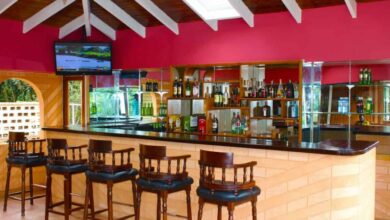South Africa
South Africa, in long form the Republic of South Africa, is a country located at the southern end of the African continent. Its administrative capital is Pretoria. It borders west-northwest with Namibia, north and north-northeast with Botswana, northeast with Zimbabwe, and east-northeast with Mozambique and l ‘Eswatini. Lesotho is a landlocked state in South African territory. South Africa had 54 million inhabitants in the middle of 2014, divided into 80.2% Black, 8.8% Colored, 8.4% White and 2.5% Asian (Indian subcontinent). A nation with very varied phenotypes, South Africa is thus in Africa the country with the largest portion of so-called colored, white and Indian populations. It is often called the “rainbow nation”, a concept coined by Archbishop Desmond Tutu to designate the diversity of the South African nation and which replaced the concept of plural society previously used by apartheid theorists (1948-1991).
Income equality between different population groups has not improved since the end of apartheid and South Africa has one of the highest inequality rates in the world. It is however a benchmark power for the African continent with one of the continent’s most developed economies and modern infrastructures covering the whole country. It is the second economic power in Africa behind Nigeria. The country is also characterized by a large population of European stock (Afrikaners, Anglo-South Africans) and by significant mineral wealth (gold, diamond, coal, etc.) which made it an essential ally of Western countries during the cold War. The name “Republic of South Africa” succeeded that of “Union of South Africa” on May 31, 1961, when the country ceased to be a monarchy and became a republic.
South Africa’s history
The Khoïsan, grouping together the Khoïkhoïs and the Bushmen, were the first known inhabitants of South Africa (40,000 BC). The first peoples of Bantu languages, originally from the current Cameroonian grassland, reach the current province of KwaZulu-Natal around the year 500 AD. In the 10th century, xhosas settled in the Fish River region (Transkei). In 1488 the Portuguese navigator Bartolomeu Dias reached the Cape of Storms (Cape of Good Hope), followed in 1497 by the Portuguese navigator Vasco de Gama which runs along the coast of Natal. The permanent establishment of Europeans in South Africa dates from 1652 with the establishment, on behalf of the Dutch East India Company, of a supply station in Cape Town run by the Dutchman Jan van Riebeeck. In 1657, several employees of the company were allowed to settle permanently in Cape Town while slaves were deported from Batavia and Madagascar to make up for the lack of labor on the spot. In 1688, two hundred French Huguenots joined the 800 citizens of the trading post and founded Franschhoek. In 1691, the Cape Colony was established. It was in 1770 that the first contacts between the Bantu and the Boer (free farmers of Franco-Dutch origin) were reported near the Great Fish River (900 km east of the mother city). Relations were quickly in conflict and, in 1779, the first of the nine Cafer wars (1779-1878) began. Between 1795 and 1804, the British occupied South Africa. The colony was briefly returned to the Dutch, between 1804 and 1806. In 1806, the Dutch definitively gave way to the British, who became the new colonial power. From 1818 to 1825, during the Mfecane, the King of the Zulus, Chaka, extended his empire over eastern South Africa at the cost of a bloody conquest over other tribal peoples. In 1835, the Boers left the Cape colony for the interior territories of South Africa in order to escape British administration. This is the Grand Trek, dotted with tragedies and battles (Battle of Blood River against the Zulus in 1838). Two independent Boer republics were finally founded and recognized by the United Kingdom: the South African republic of Transvaal (1852) and the Orange Free State (1854).
In 1866, the Cape Colony also extended its territory and annexed the British cafeteria while the first diamonds were discovered at Kimberley, then gold deposits in the Witwatersrand at the Transvaal.
In 1879, during the Anglo-Zulu War, the British suffered a historic defeat at the Battle of Isandhlwana before finally winning in Zoulouland. After the annexation of other tribal territories, one of the biggest speculations in stock market history provoked the stock market crisis of the South African gold mines of 1895, at the time of the Jameson Raid, perpetrated by the British, with a view to drilling mines up to 4 kilometers underground. Partly motivated by these gold mines, the Second Boer War (1899-1902) and the annexation of the Transvaal and the Orange Free State enshrined British domination over most of southern Africa, at cost of internment and death of thousands of Boer civilians in concentration camps. On May 31, 1910, eight years after the end of the Second Boer War and after four years of negotiations, the South Africa Act granted nominal independence, creating the Union of South Africa. The country is founded from the regrouping of the colonies of Cape Town, Natal, Transvaal and Orange. The South Africa Act establishes a parliamentary democracy on the Westminster model with a constitutional monarchy-type regime and a sovereign parliament. The procedures for granting the right to vote differ, however, between the four new provinces (if the electoral body is essentially white, the provinces of Natal and Cape Town grant the right to vote to people of color known as “civilized”). General Boer Louis Botha becomes the first head of the South African government.
In 1912, a political party, the African National Congress (ANC), was founded in Bloemfontein, claiming greater participation of black populations in the affairs of the country. The following year, the Native land act was adopted. Based on the system of reserves established in colonial times and in the Boer republics, it divides the South African territory between indigenous lands (7% then 13% of the territory) and lands intended for whites and public administrations (87 % of the territory). In 1915, engaged in the First World War, the South African troops suffered heavy losses in the Somme (France). In Africa, they took control of German South West Africa (future Namibia) which was granted to them under mandate by the League of Nations in 1920. In 1918, the Broederbond, a secret society was founded with the aim of promoting the political, social and economic of the Afrikaners (the name that has become common among the Boers).
The hard-repressed Afrikaners of the Witwatersrand workers’ revolt in 1922 enabled the white nationalists to unite and win the general elections of 1924 under the leadership of James Barry Hertzog. In 1934, faced with the economic crisis, Hertzog nevertheless united with the liberals of Jan Smuts to form a government of national unity. At the same time, anthropologists and linguists from the University of Stellenbosch like Werner Max Eiselen forged a new social and political concept which would give birth to the ideology of apartheid: rejecting the idea of a unique South African society, they propose to separate geographically, politically and economically the blacks and whites of South Africa as well as the different ethnic groups between them, in order to maintain and reinforce their ethnic and linguistic identities and to fight against the effects that they consider acculturating of the urbanization and migrant work on traditional African structures. In 1936, the electoral franchise of the black populations in Cape Town was abolished. In 1939, the country, under the leadership of Smuts, joined the Allies in the Second World War. In 1945, Smuts participated in the drafting of the preamble of the United Nations.
In 1948, the national party won the general elections. The new Prime Minister, Daniel François Malan, sets up the policy of apartheid, reinforced in 1956 by the abolition of the franchise of the voting rights of the Coloureds (Strijdom government). In 1958, Hendrik Verwoerd became Prime Minister. In 1960, the Sharpeville massacre and then the ban on the ANC and African nationalist movements led to the condemnation of the policy of apartheid by the United Nations and by the international community. On May 31, 1961, the country became a republic following a referendum in which the majority of voters voted for the end of the monarchy. The Republic of South Africa was then proclaimed, and the country’s last Governor General, Charles Swart, thus became the first President of State. The country is also withdrawing from the Commonwealth. The ANC then began the armed struggle in the Umkhonto we Sizwe. In 1963, Nelson Mandela, one of the leaders of Umkhonto we Sizwe was sentenced to life imprisonment for terrorism and the other leaders of the ANC were imprisoned or exiled. In 1966, Hendrik Verwoerd, Prime Minister of South Africa and great architect of apartheid, was assassinated. In 1976, riots in the township of Soweto against compulsory education in Afrikaans led the government to declare a state of emergency while the Bantustan of the Transkei was declared independent under the policy of apartheid.
In 1984, to break the political deadlock, the political regime was presidential and a tricameral parliament, open to the Indians and the Coloureds, was inaugurated. However, the state of emergency was proclaimed again in 1986 when international economic and political sanctions isolated the country despite the repeal of symbolic apartheid laws such as the internal passport. Only the State of Israel continues to have discreet relations and collaborates with the authorities from the military and security point of view (exchange of technologies, arms manufacturing license contracts, technical exchanges on internal security and know-how. spy). In 1990, the new South African president, Frederik de Klerk, legalized the ANC, the South African communist party and all black movements. Nelson Mandela is released.
In June 1991, the government abolished the last apartheid laws and began a process of constitutional transition (Codesa). This process of negotiations allows, among other things, the creation of a new constituent assembly, which examines an interim draft constitution in 1993. The new promulgated constitution reorganizes the South African state around the key values of freedom, equality, dignity and places a Constitutional Court on top. The hard-negotiated democratic transition process culminated on April 27, 1994 in the first multiracial elections in the country’s history, won by the ANC. Nelson Mandela then becomes the first black president of the country. At the same time, the country returned to the Commonwealth. In 1995, a Truth and Reconciliation Commission was set up, and the following year, on December 10, 1996, a new South African constitution was adopted, mainly based on the provisional constitution of 1993. From 1999 to 2008, the country was chaired by Thabo Mbeki. Thus appeared alongside the white bourgeoisie a black bourgeoisie; neither the ANC, the Communist Party, nor the COSATU union (“Congress of South African Trade Unions”) have called into question the economic and social order. On the contrary, privatizations have multiplied. South Africa is one of the most unequal countries in the world, as evidenced by its Gini coefficient.
Following the economic and social difficulties which appeared during the second mandate of Thabo Mbeki, characterized in 2008 by a serious shortage of electricity in South Africa and the deterioration of infrastructure, his party the ANC withdrew his mandate on September 21, 2008 Thabo Mbeki offers his resignation to the Parliament which then elects Kgalema Motlanthe to complete his mandate until the general elections of 2009. After the general elections of April 22, 2009, won by the ANC, Jacob Zuma, former vice-president from 1999 to 2005, becomes the new president of the Republic. He was sworn in on May 9, 2009 and formed a government more open to minority political parties, including the Communist Party but also, for the first time since 1994, the Freedom Front (Right Afrikaner). The 2012 Marikana massacre, in which the police shot striking workers who killed dozens, tainted the governance of the ANC among its electorate, but during the 2014 South African general elections, Jacob Zuma was re-elected for a second mandate, the ANC remaining clearly in the lead in the electorate although in decline vis-à-vis the Democratic Alliance and the Fighters for economic freedom of Julius Malema.
Affected by corruption cases, Jacob Zuma resigned under pressure from his party in early 2018, after being threatened with dismissal, and Cyril Ramaphosa succeeded him as interim President of the Republic. On February 15, 2018, the Parliament formally elected Cyril Ramaphosa President of the Republic. He was re-elected head of state on May 22, 2019, after general elections in which the ANC obtained the lowest score in its history (57.5%), falling below 60% for the first time in a quarter of a century and thus paying for the errors and scandals of the Zuma era, its predecessor. He also faces internal opposition within the ANC, with a clan that remains loyal to Jacob Zuma, chaired by ANC secretary general Ace Magashule and his assistant Jessie Duarte. A wave of xenophobia towards migrants, “foreigners”, is also shaking the country. On February 10, 2020, Cyril Ramaphosa is expected to assume the presidency of the African Union, succeeding Abdel Fattah al-Sissi.
South Africa’s politics
Organization of powers
The regime has been parliamentary since the South Africa Act in 1910 and universal suffrage in force since 1994. The South African constitution, the fifth of the South African state, was promulgated by President Nelson Mandela on December 10, 1996 and entered effective February 4, 1997. The functions of head of government and head of state merge under the title of President of the Republic of South Africa. The latter is elected by parliament. The South African parliament is made up of two chambers: a lower house, the national assembly and an upper house, the National Council of Provinces (NCoP). The 400 members of the National Assembly are elected by proportional list system. The NCoP, which replaced the Senate in 1997, is made up of 90 members representing the nine provinces. Each province has a unicameral provincial legislature, and an executive council chaired by a prime minister (first in English and Afrikaans). The provinces are less autonomous than those, for example, of Canada or the states in the United States. It is then a moderate federal system. The state has 11 official languages which, in practice, are treated differently, Afrikaans losing ground before English favored by the ANC.
Finally, the South African judicial system is hybrid in the sense that it is based on the common law system for administrative activities, while private law is essentially steeped in the Romano-Germanic tradition. The judicial organization is divided, like the Anglo-Saxon model, between local courts, Magistrates’ Courts, provincial high courts of appeal and a Supreme Court of appeal when non-constitutional cases are at stake. The system South African judiciary is overseen by a Constitutional Court, the country’s supreme body responsible for exercising control over the constitutionality of acts of parliament and government and of all other causes if the interests of justice so require. The Constitutional Court, of the Mixed Supreme Court type, sits at Constitution Hill, Braamfontein, Johannesburg.
Political trends, parties and elections
From the general elections of 1994 to those of 2014, the ANC dominates political life and remains by far the first party in the country, in particular because it is the only one to have been able to achieve a complete electoral network of the country, having militants up to the most remote villages.
The government must resolve the problem of violence in the country’s countryside: land reform requires redistribution of land to blacks and Afrikaner farmers often have to sell their holdings to the government, which provokes resistance. These farmers, about 35,000 in number, are sometimes attacked by organized gangs and some enroll in commando courses to make up for the lack of government assistance. Several far-right parties continue to recruit from a section of this population that feels abandoned. However, since the election of Jacob Zuma in 2009, the electoral performance of the ANC has been disputed by a heterogeneous opposition which, although fragmented, has progressed strongly. In 2014, if the ANC clearly won, for the fifth time, the general elections with 62.15% of the votes, it achieved its worst national score, notably against the Democratic Alliance (22.23%) and the Fighters for economic freedom (6.35%), a young radical party led by Julius Malema. In the 2016 South African municipal elections, the ANC recorded its largest electoral decline and its lowest national score (53.91%). If it still manages to keep the vast majority of municipalities, in particular in rural areas (with the notable exception of the municipalities of Western Cape), the ANC is beaten in the largest cities of the country (Cape Town, Tshwane , Johannesburg, Nelson Mandela Bay) for the benefit of Democratic Alliance, sometimes allied for the occasion to the Malema party. This national decline in the ANC can be analyzed as linked to the corruption scandals targeting President Jacob Zuma and the poor economic performance of South Africa.
South Africa’s economy
South Africa’s main economic power for a long time, South Africa’s gross domestic product (GDP) has been ranked behind that of Nigeria since 2014 following a change in statistical calculation, although this country remains largely behind Africa from the South in terms of development or per capita GDP. A capitalist country favorable to the market economy, South Africa has opted for an economic liberalism tempered by a strong involvement of the State in order to regulate the economy, modify the unequal distribution of wealth and ensure better protection of the most disadvantaged social categories historically and economically. South Africa represents a quarter of African GDP with an average growth rate of 5% per year. Its transport network, its energy installations (with the only nuclear power plant on the continent at Koeberg), have made it an almost developed country. The country benefits from a subsoil rich in raw materials like gold, of which it is one of the main world producers, of platinum and precious metals, and especially immense reserves of coal, first mining production of the country in 2016. In addition, South African multinationals are prosperous and competitive in international markets. Of the 100 largest African companies, 61 are South African.
South Africa’s demography
The South African population was nearly 54 million in 2014. It is unevenly distributed: most of the inhabitants live in the east of the country. Gauteng is the most populated region followed by KwaZulu-Natal. The aridity partly explains the low densities of the northwest. According to the 2010 census, 79.2% of South Africans are black, 9.4% are white, 8.8% are colored (mestizo) and 2.6% of South Africans are Indo-Asian. The black population is divided into different ethnic groups, the most important of which are the Zulus and the Xhosa. Concentrated in the east of the country, it is however a minority in the two provinces of Western Cape and North Cape. Among the country’s white population, the oldest, the Afrikaners (or Boers) represent a proportion of 60% of the country’s whites. The ancestors of these Afrikaners were from the Netherlands or Northern Europe. A significant part were also French Huguenots (see also the article Huguenots from South Africa) who settled in the Cape colony during the religious wars in France (the latter are however part of the Afrikaner community, we also estimates that 25% of Afrikaner surnames are of French origin). The other whites (40%) are mainly of British, Portuguese and German origin.
According to a SAIRR (South African Institute for Race Relations) report, around 900,000 whites, or one sixth of the population, have left the country since 1994. These massive departures, mainly of young South African graduates, have been reported. by the opposition which attacked the ANC on these too many departures. However, there has been a new phenomenon since then, the “homecoming revolution”. So while power outages, high crime rates and political uncertainty discouraged white South Africans from rushing to emigrate, exiles in their new countries experienced some of the financial problems during the global crisis. Despite the fear of crime and positive discrimination, they were forced to return to South Africa. Although there are no official statistics, Charles Luyckx, the executive director of Elliott International, which holds nearly 30% of the moving market share, said that there were four departures for a return in 2008, the ratio is approaching one to one in 2009.
South Africa’s education
Many children from rural areas do not have an identity document or birth certificate, which is sometimes too expensive to fetch for parents. The NGO Scalabrini Center estimates that 40% of these children remain outside the education system.
South Africa’s language
There is no predominantly dominant mother tongue in South Africa. In 1910, Dutch was, along with English, one of the two official languages recognized by the new institutions of the Union of South Africa. In May 1925, Afrikaans was promoted to the rank of official language instead of Dutch (Union Act No 8 of 1925). Since 1994, eleven official languages (English, Afrikaans, Zulu, xhosa, swati, ndebele, sesotho, sepedi, setswana, xitsonga, tshivenda) are recognized by the South African Constitution According to article 6 of the South African constitution of 1996 , the state and the provinces must also promote the languages spoken by the various communities living in the country; the main ones are: German, Greek, Gujarati, Hindi, Portuguese, Tamil, Telugu, Urdu, Arabic, Hebrew, Sanskrit. In fact, Zulu is the mother tongue most spoken in South African households (around ¼ of the inhabitants), followed by Xhosa (17.6%). In third place comes Afrikaans with 14% of maternal speakers. But as it is used as a second language by more than 30% of South African citizens, Afrikaans is indirectly the second most spoken language in the country. However, it suffers from competition from English, which seems more useful and remains the language of business and communication. Generally speaking, English is progressing in all walks of life and particularly among young educated people, many of whom require higher education in this language, and thus becomes a lingua franca. If English is the first of the second languages and 85% of the country’s population speak it (including more than 90% among whites) or have some knowledge of it, it is really only a little bit their mother tongue. less than 5 million citizens of South Africa. It also remains misunderstood in rural areas or among the elderly and members of fairly isolated local tribes.
-
South Africa
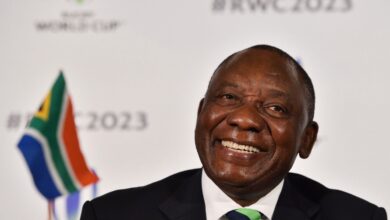
South African President Ramaphosa Slams US Over Sandton Terror Warning Alert
South African President Cyril Ramaphosa on Thursday slammed the United States government for failing to discuss a terror alert issued…
Read More » -
South Africa
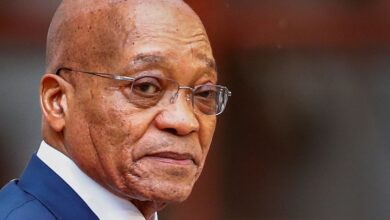
Former South African President Jacob Zuma Set Free After Prison Term Ends
Former South African President Jacob Zuma has been released from prison following the expiry of his prison sentence for contempt…
Read More » -
South Africa

South African President Ramaphosa Calls On People To Use Electricity Sparingly
South African President Cyril Ramaphosa on Monday warned that there was no prospect of improvement in the ongoing electricity crisis…
Read More » -
South Africa

South African President Appoints Nine-Member Anti-Corruption Advisory Council
South African President Cyril Ramaphosa on Monday appointed a nine-member National Anti-Corruption Advisory Council (NACAC) to advise the government on the…
Read More » -
South Africa
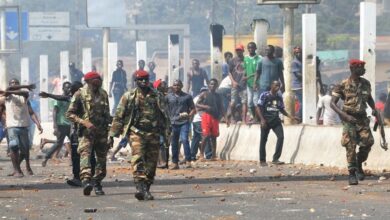
South African Workers Protest Against Rising Cost of Living As Inflation Rate Hits High
South African workers came out on the streets on Wednesday to be a part of a nationwide strike in protest against…
Read More » -
South Africa
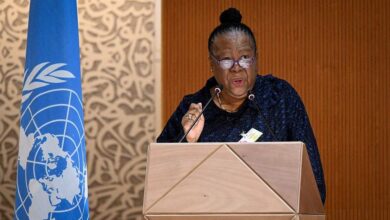
South African Foreign Minister Pandor Calls For Unity In Tackling Global Challenges
South African Minister of International Relations and Cooperation, Naledi Pandor, on Monday called out world leaders to come together to…
Read More » -
South Africa
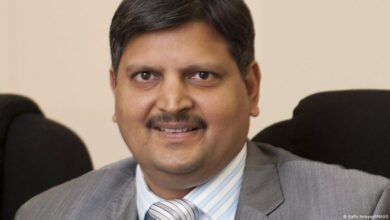
South African Government Submits Formal Extradition For Gupta Brothers
The South African government on Monday officially submitted a formal application to the United Arab Emirates for extradition of the…
Read More » -
Ivory Coast
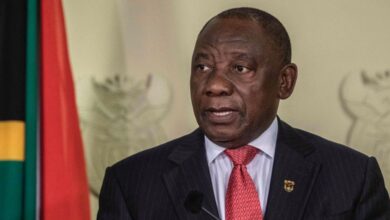
South African, Ivory Coast Leaders Welcome Russia-Ukraine Grain Supply Agreement
South African and Ivory Coast leaders on Friday lauded a deal signed by Russia and Ukraine that allows wheat and…
Read More » -
South Africa
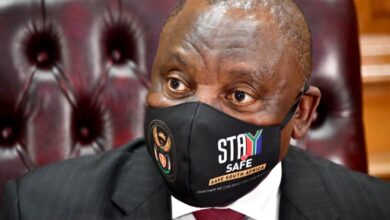
South African President Vows To Take Measures To Address Load Shedding Issue
South African President Cyril Ramaphosa on Monday promised to take measures to stabilize the electricity system in the country, which…
Read More » -
South Africa

South Africa’s Health Authorities Confirm Third Monkeypox Case In Limpopo Province
South Africa’s health authorities on Tuesday confirmed a third case of monkeypox, in a 42-year-old male tourist from Switzerland, in…
Read More » -
South Africa
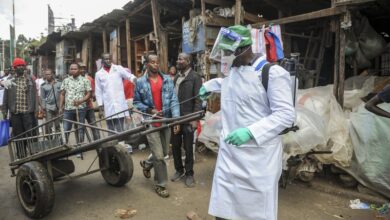
South Africa’s NICD Confirms Second Monkeypox Case Without Any Travel History
South Africa’s National Institute for Communicable Diseases (NICD) on Tuesday confirmed that a second case of monkeypox has been reported…
Read More » -
South Africa
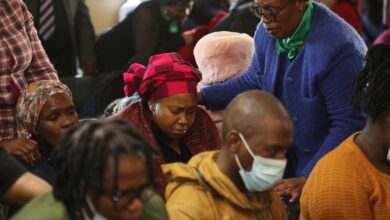
South African Police: Teenagers Killed By Something They Ate, Drank Or Smoked
South African authorities investigating the mysterious death of at least 21 teenagers at a township tavern over the weekend said…
Read More » -
Health

South African Health Authorities Report Country’s First Monkey Pox Case
The South African health authorities on Thursday reported the country’s first case of monkeypox, adding its name to the list…
Read More » -
South Africa
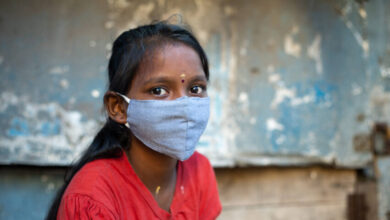
South African Health Minister Phaala Repeals Remaining COVID-19 Measures
South African Health Minister Joe Phaahla on Wednesday confirmed the government has repealed regulations requiring face masks, restrictions on gatherings…
Read More » -
South Africa
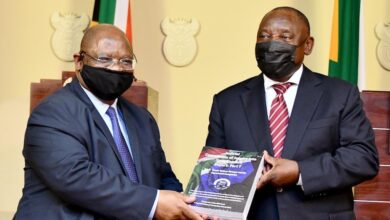
South African Chief Justice Hands Over Final Report To President Ramaphosa
South African Chief Justice Raymond Zondo on Wednesday handed over the final part of the report of an investigation into…
Read More » -
South Africa

South African President Ramaphosa Denies Interference In Corruption Report
South African President Cyril Ramaphosa has denied allegations of interfering with the country’s judiciary over delays in the presentation of…
Read More » -
South Africa
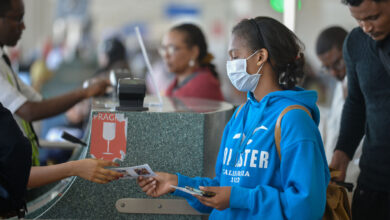
World Bank Approves Loan To Help South Africa Fund COVID-19 Vaccine Purchases
The World Bank has reportedly approved a loan of 454.4 million euros ($474.4 million) to help South Africa fund COVID-19…
Read More » -
South Africa

South African Government Confirms Arrest Of Two Gupta Brothers In UAE
The South African government on Monday confirmed the law enforcement authorities in the United Arab Emirates (UAE) have arrested Rajesh…
Read More » -
South Africa

South African President Says Bystander Countries Suffering From Russia Sanctions
South African President Cyril Ramaphosa on Tuesday said bystander countries were suffering due to sanctions imposed against Russia, reported Yahoo…
Read More » -
South Africa
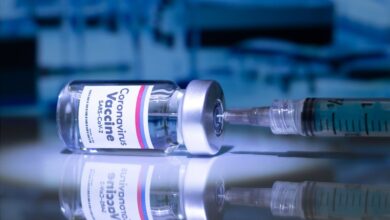
Africa CDC Urges Covid-19 Vaccine Buyers To Place Orders With S.Africa’s Aspen
The Africa Centers for Disease Control and Prevention (Africa CDC) on Thursday urged COVID-19 vaccine buyers to place orders with…
Read More » -
South Africa
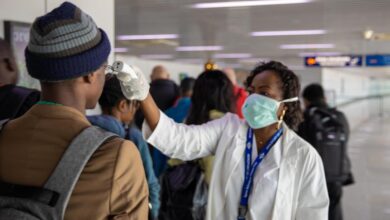
South African Health Minister Says Country Likely In New Covid-19 Wave
South African Health Minister Joe Phaahla on Friday said the country may have likely entered a new wave of Covid-19…
Read More » -
Health

WHO Says Africa Seeing An Increase In Covid-19 Cases Driven By South Africa
The World Health Organization (WHO) on Thursday said Africa is witnessing an increase in Covid-19 cases largely driven by a…
Read More » -
South Africa

South African President Declares State Of National Disaster Over Heavy Floods
South African President Cyril Ramaphosa on Monday declared a state of national disaster in the country, a week after devastating…
Read More » -
South Africa
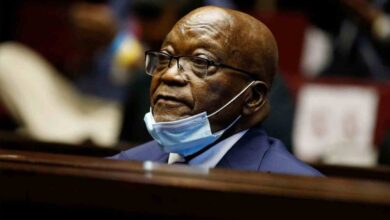
Former South African President Jacob Zuma’s Trial Gets Delayed Once Again
Former South African President Jacob Zuma’s corruption trial was delayed once again on Monday, hours after it began, reported Reuters.…
Read More »


